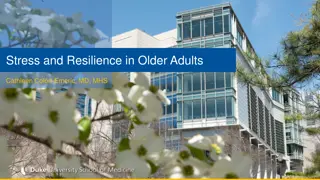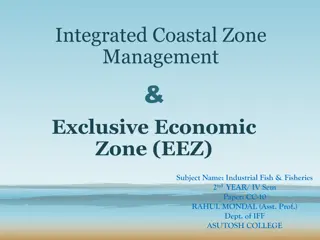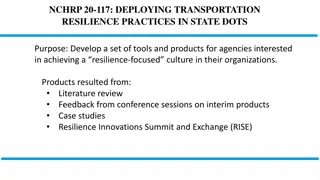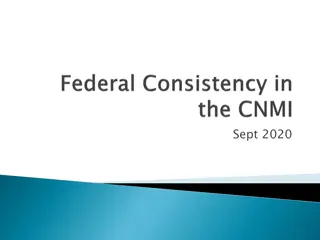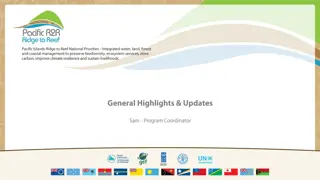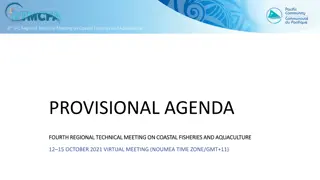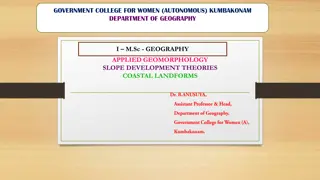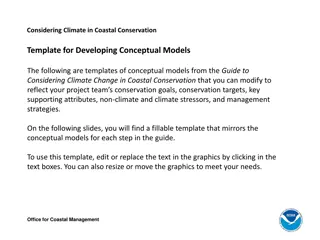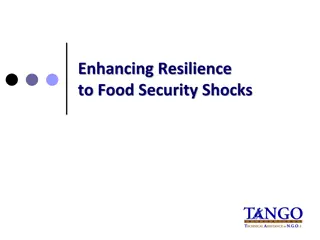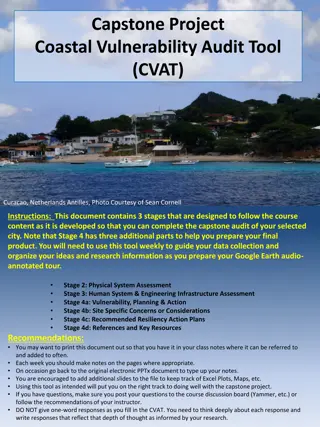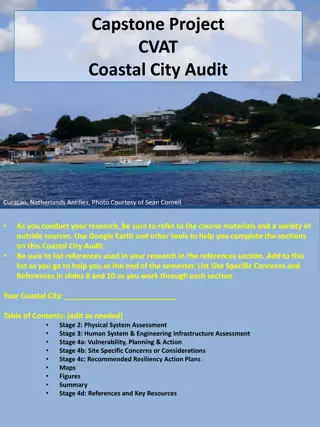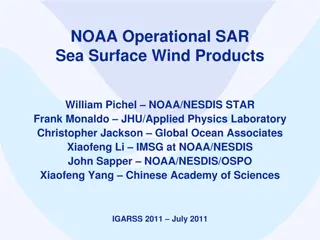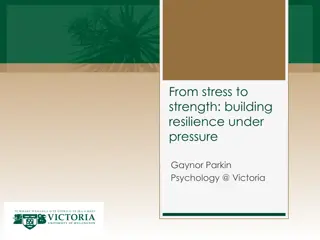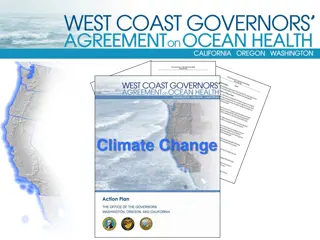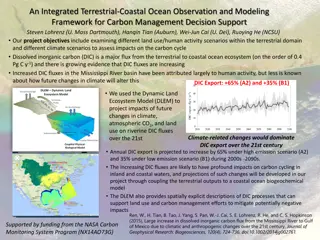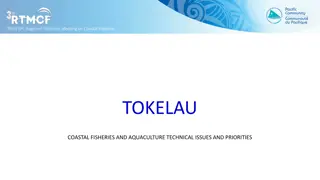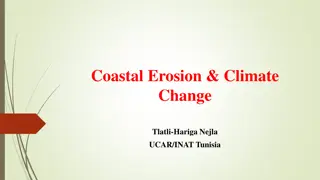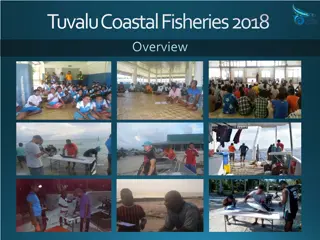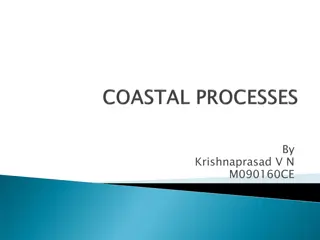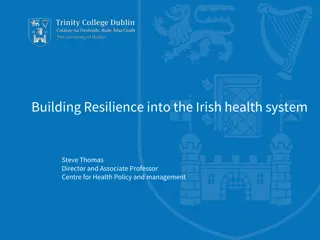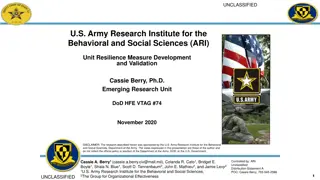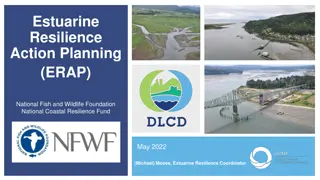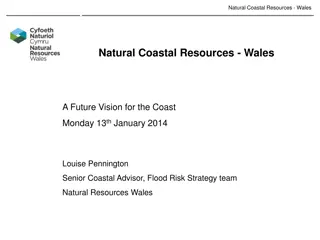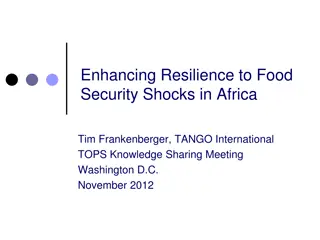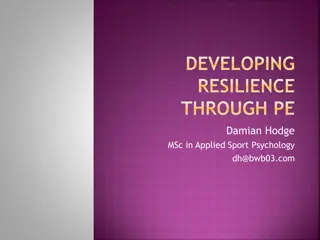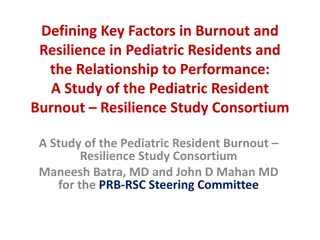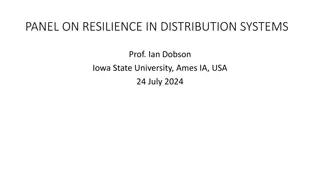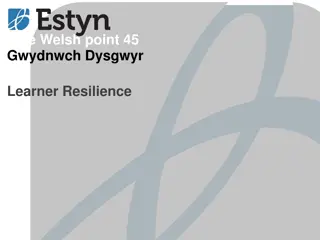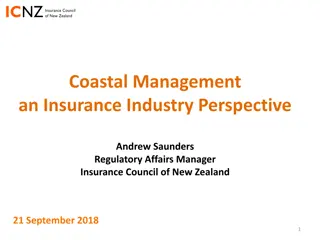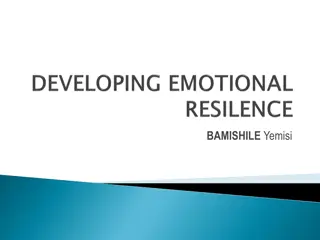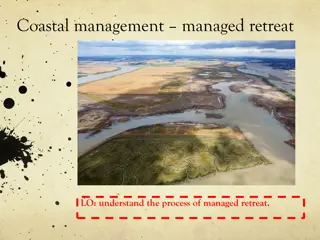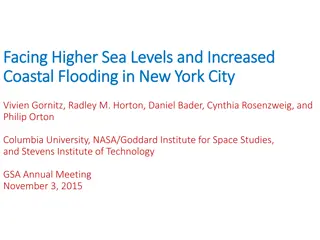Enhancing Educational Resilience with RESTA Model
RESTA is an evidence-based intervention model designed to boost Educational Resilience in young individuals by involving educational staff. It differs from other support models by incorporating insights from educational resilience and trauma-responsive practices. Two underpinning models and RESTA pr
0 views • 12 slides
Cummins Supply Chain Resilience Session Overview
Explore how Cummins has invested in supply chain resilience after a major flood in 2008, including partnering with Horizonscan for a Supplier Resilience Program. Discover insights into their approach, benefits to suppliers, and the importance of supplier resilience. Follow their journey and internal
1 views • 10 slides
Coastal Monitoring and Lessons Learned in Southwest England
Southwest England's coastal monitoring efforts, including the South West Coastal Monitoring program and lessons learned from the destruction of Hallsands in 1917 due to lack of understanding of coastal processes. The monitoring involves data collection on beach profiles, bathymetry, wave patterns, a
4 views • 15 slides
Coastal Path Promotion Poster Design for Wales
Design promotional posters for the Coastal Path in Wales to encourage visitors to explore the 870-mile long coastal walking path accessible to walkers, cyclists, families, limited mobility individuals, and horse riders. Discuss the essence of marketing, its impact, target audience, and advantages an
4 views • 28 slides
Understanding Stress and Resilience in Older Adults
Explore the complex interplay between stress and resilience in older adults, examining models of physical and neurological resilience, recovery trajectories after hip fracture, and dynamic indicators of resilience. Considerations include psychosocial resilience factors like external support, social
0 views • 19 slides
Integrated Coastal Zone Management & Exclusive Economic Zone (EEZ) - Sustainable Coastal Management
The coastal zone is a vital area where land and sea interact, presenting dynamic challenges and opportunities. Integrated Coastal Zone Management (ICZM) is a science-based approach to managing coastal areas, aiming for sustainability by balancing environmental, economic, and human activities. ICZM,
0 views • 10 slides
Building Resilience: A Guide for Families
Explore examples of adversity and the importance of resilience. Learn what resilience is, how it can be developed, and why it matters. Discover ways parents and caregivers can assist children in building resilience through practical strategies. Myth versus reality around resilience is debunked, emph
0 views • 15 slides
Disaster Resilience Strategy in Developing Countries Vulnerable to Natural Disasters
The IMF's policy paper highlights key challenges faced by small states in building resilience, such as under-investment and donor support post-disaster rather than pre-disaster. The Disaster Resilience Strategy (DRS) emphasizes three pillars for intervention: post-disaster resilience, financial resi
0 views • 11 slides
Deploying Transportation Resilience Practices: Tools and Insights
Develop tools for fostering a resilience-focused culture in state DOTs through literature review, case studies, and feedback. Explore various definitions of resilience, including organizational perspective, and key observations from the Transportation Resilience Innovations Summit. Emphasize the imp
0 views • 32 slides
Understanding Federal Consistency in Coastal Zone Management
This presentation serves as an introduction to Federal Consistency in the context of Coastal Zone Management, emphasizing the importance of compliance with enforceable policies outlined in the Coastal Zone Management Act. It highlights the role of the Division of Coastal Resources Management (DCRM)
1 views • 13 slides
Regional Integrated Coastal Management and Island Water Resources Resilience Program
The program focuses on strengthening national and local capacities for integrated coastal management and island water resources resilience, incorporating climate change adaptation. It involves investments in human capital, mainstreaming approaches into development planning, establishing regional and
0 views • 8 slides
4th SPC Regional Technical Meeting on Coastal Fisheries and Aquaculture - Provisional Agenda
The 4th SPC Regional Technical Meeting on Coastal Fisheries and Aquaculture is set to take place on 12-15 October 2021 in a virtual format. The agenda includes sessions on integrating e-data systems into coastal fisheries, enhancing capacity for fisheries management, and community-based fisheries di
0 views • 9 slides
Understanding Coastal Landforms: Formation and Characteristics
Coastal landforms are features shaped by erosion and sedimentation processes along coastlines. These landforms, including headlands, cliffs, bays, spits, salt marshes, and beaches, are predominantly influenced by factors such as wave action, longshore currents, tides, and climatic elements like wind
0 views • 35 slides
Coastal Conservation Strategies for Climate Resilience
Develop conceptual models for coastal conservation goals, targets, and management strategies in the context of climate change. Templates provided for reducing coastal flooding using natural areas, addressing non-climate and climate stressors, and implementing effective management strategies to enhan
3 views • 6 slides
Understanding Resilience in Food Security Shocks
Resilience in the context of food security shocks involves the ability of individuals, households, communities, and systems to bounce back and recover from various stressors. This resilience is crucial in regions facing continuous crises like the Horn of Africa and the Sahel, where factors beyond we
1 views • 21 slides
Understanding Resilience: A Comprehensive Exploration
Resilience is portrayed as a dynamic process rather than an inherent trait, accessible to all individuals. The capacity for resilience can be developed and harnessed through various resources and support systems. This narrative delves deep into the ordinary yet powerful aspects of resilience, emphas
1 views • 13 slides
Coupled Terrestrial-Coastal Modeling of Carbon Exchange in the Gulf of Mexico
Explore the interactions between terrestrial and coastal systems in the Mississippi-Atchafalaya Basin and Northern Gulf of Mexico through coupled terrestrial-coastal ocean modeling. The study focuses on carbon dynamics, uncertainties in coastal carbon budgets, and the NASA IDS project's approach. Fu
3 views • 26 slides
Coastal Vulnerability Audit Tool (CVAT) for Curacao, Netherlands Antilles
This document outlines the stages of the Coastal Vulnerability Audit Tool (CVAT) for assessing the physical system and human system & engineering infrastructure of Curacao, Netherlands Antilles. It covers key aspects such as coastal setting, climatic and tectonic settings, topographic profile, coast
0 views • 10 slides
Coastal Vulnerability Assessment of Curacao, Netherlands Antilles
Conduct a comprehensive Coastal Vulnerability Audit of Curacao, Netherlands Antilles, using the Coastal Vulnerability Audit Tool (CVAT) to assess physical, human, and engineering infrastructure systems, as well as vulnerability, planning, and resiliency action plans. Consider factors such as climati
0 views • 10 slides
NOAA SAR High-Resolution Coastal Winds Overview
NOAA's Operational SAR Sea Surface Wind Products provide detailed information on wind patterns derived from SAR images. The system aims to implement high-resolution wind production, capable of deriving winds from various SAR satellites. The operational goals include compatibility with international
0 views • 28 slides
Building Resilience: From Stress to Strength
Psychological resilience allows individuals to bounce back from stress, adversity, and change effectively. This book by Gaynor Parkin delves into what promotes resilience, highlighting the importance of everyday habits and exercises in building resilience. The evidence presented covers the role of p
0 views • 23 slides
Coastal Climate Change Impacts and Adaptation Strategies Overview
This overview delves into the impacts of climate change on coastal areas, including shoreline changes, coastal hazards, and coastal geomorphic systems. It highlights the physical forcing mechanisms, such as sea level rise and increased storm activity, affecting these regions. The assessment emphasiz
0 views • 14 slides
Integrated Terrestrial-Coastal Ocean Framework for Carbon Management
An advanced framework integrating terrestrial and coastal ocean observations and modeling is developed to support carbon management decisions. The study focuses on assessing the impacts of land use, human activities, and climate scenarios on the carbon cycle, particularly dissolved inorganic carbon
0 views • 5 slides
Coastal Fisheries and Aquaculture Priorities in Tokelau
This document discusses the technical issues and priorities for coastal fisheries and aquaculture in Tokelau, a group of low-lying coral atolls heavily dependent on coastal resources. It highlights the need for assessing fisheries resources, supporting sustainability, and exploring aquaculture poten
0 views • 6 slides
Understanding Coastal Erosion and Climate Change Impact in Tunisia
Coastal erosion and climate change pose significant threats to Tunisia's coastal areas, affecting ecosystems, economy, and human livelihoods. Climate change exacerbates erosion through rising sea levels, extreme weather events, and human activities. Understanding these phenomena is crucial for susta
0 views • 18 slides
Tuvalu Coastal Fisheries 2018 Overview and Current Activities
Tuvalu Coastal Fisheries Department aims to maximize social and economic returns by sustainably managing marine resources. Their priorities include supporting livelihoods through inshore fisheries and generating revenue from oceanic fisheries. The Coastal Division focuses on outer island and Funafut
0 views • 8 slides
Understanding Coastal Processes: Erosion, Deposition, and Human Impact
Coastal processes involve a complex interplay of erosion, deposition, and human activities that impact the dynamic equilibrium of coastlines. Energy from tides, waves, wind, and currents shape the land-water interface, while human use of coasts introduces conflicts leading to unstable systems. Sedim
0 views • 44 slides
Enhancing Resilience in the Irish Health System During Economic Contractions
The Resilience Project conducted at Trinity College Dublin focused on fortifying the Irish health system amidst economic challenges. The project aimed to identify strategies to protect health resources, manage scarcity, pursue reforms, and anticipate future crises. Three key pillars of health system
0 views • 27 slides
Understanding Unit Resilience in the Army: Research Insights
Resilience at the unit level in the Army is essential for sustained performance and readiness. This research project, sponsored by the U.S. Army Research Institute, focuses on measuring and understanding team resilience components and their impact on overcoming stressors. The study aims to validate
0 views • 22 slides
Estuarine Resilience Action Planning Overview
Estuarine Resilience Action Planning (ERAP) led by Michael Moses aims to enhance coastal resilience through community-driven, green infrastructure solutions. The three-part approach includes needs assessment, action analyses, and goal setting. The focus is on leveraging local partnerships and incorp
0 views • 6 slides
Coastal Resources Management in Wales: A Sustainable Vision for the Future
Coastal resources in Wales are being strategically managed to ensure sustainability and resilience in the face of challenges such as flood defense, erosion, tourism, and industrial resilience. The vision for maintaining and enhancing these resources influences long-term strategic planning and is inc
0 views • 11 slides
Enhancing Resilience to Food Security Shocks in Africa
Enhancing resilience involves anticipating, adapting to, and recovering from hazardous occurrences in a way that protects livelihoods and supports development. Resilience is vital in regions facing continuous crises due to complex interactions of political, economic, social, and environmental factor
0 views • 32 slides
Developing Resilience Through Physical Education: Strategies and Insights by Damian Hodge
Damian Hodge, an experienced Sport Psychology Manager, shares his expertise in developing resilience through PE sessions for children. He emphasizes the importance of resilience, provides insights on children's experiences, and highlights the significance of fostering resilience in overcoming challe
0 views • 25 slides
Pediatric Resident Burnout & Resilience Study Consortium Overview
This study aims to investigate the factors influencing burnout and resilience in pediatric residents, with a focus on enhancing well-being and performance. The Pediatric Resident Burnout Resilience Study Consortium (PRB-RSC) involves over 20 residency programs in the U.S. to examine the epidemiology
0 views • 18 slides
Enhancing Power System Resilience: Insights and Strategies
Explore the critical aspects of power system resilience in distribution systems, focusing on extreme events, asset hardening, fast recovery, and administrative processes. Learn how resilience differs from reliability, robustness, and other concepts, and discover practical strategies to implement res
0 views • 13 slides
Understanding Resilience in Learners: Key Approaches and Factors
Resilience in learners plays a crucial role in academic performance and emotional well-being. It involves the ability to cope with challenges and adversities. Factors such as self-esteem, self-confidence, and positive relationships contribute to enhancing resilience. This report by Estyn explores ef
0 views • 19 slides
Coastal Management and Insurance Industry in New Zealand
Coastal areas in New Zealand face risks from flooding, storm surges, and sea-level rise, making insurance crucial for managing property losses. Insurers respond to coastal risks by adjusting premiums, excesses, and coverage. Long-term coastal planning involves managing risks through strategic buildi
0 views • 6 slides
Enhancing Emotional Resilience: Key Strategies and Benefits
Exploring the concept of emotional resilience, this content covers the definition of emotions, emotional resilience, and the domains of resilience. It delves into the importance of emotional resilience, ways to improve it, and how it helps individuals bounce back from adversity, maintain balance, an
0 views • 17 slides
Understanding Managed Retreat in Coastal Management: Wallasea Island Case Study
Wallasea Island in Essex, England employed managed retreat as a coastal management strategy, removing the sea wall to allow natural coastal processes. This decision, despite impacting local agriculture, led to the creation of salt marshes, serving as a cost-effective and environmentally beneficial s
0 views • 7 slides
Facing Higher Sea Levels and Coastal Flooding in New York City: Impacts and Resilience Strategies
The research highlights the increasing threat of higher sea levels and coastal flooding in New York City, exemplified by Hurricane Sandy. It discusses observed sea level rise trends, top coastal storm floods, and climate change projections. Initiatives like the New York City Panel on Climate Change
0 views • 22 slides




